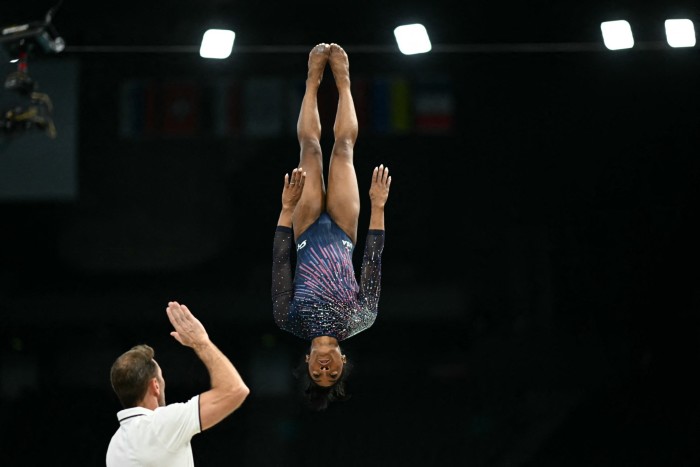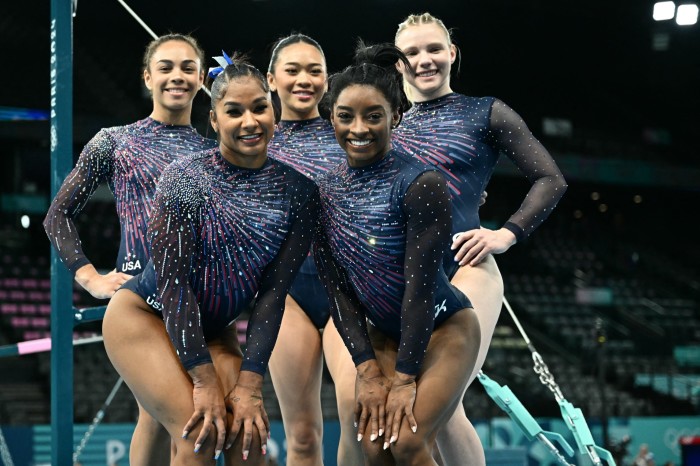
Three years after a shock withdrawal from most of her events at the Tokyo Olympics, US star gymnast Simone Biles has billed her participation at the Paris games as her “redemption tour”.
At 27, the four-time Olympic gold medal winner entered the Paris games in the same fashion she did in Tokyo: the favourite in many of her events and a star attraction for spectators and television viewers at home.
After her bout of the “twisties” — a phenomenon where a gymnast’s body does not perform as her mind instructs — and a period away from competing, Biles has emerged as a model of sporting longevity.
That success reflects athletes’ increasing focus on strengthening their mental health to protect themselves in highly pressured environments and Biles’ own sport’s shift towards routines based on power and skill.
After qualifying for Paris earlier this month, Biles told a reporter what had changed from her Tokyo low point. “Being in a good mental spot. Seeing my therapist every Thursday is kind of religious for me — that’s why I am here today.”
She has also been dutiful about conditioning and physical recovery in her late 20s, in a sport whose athletes traditionally hit their prime in late teens. “I never pictured going to the Olympics after Tokyo. [But] I’m like ‘oh my gosh, I’m still doing it, I’m still capable’.”
In Sunday’s qualifying rounds in Paris, Biles flipped her way to the top seed in the individual all-around, nearly two full points ahead of Brazil’s Rebeca Andrade, her top rival. But she appeared mortal, limping awkwardly after a warm-up, which her coach later attributed to a twinge in her calf.
In many disciplines, gymnastics has shifted from the balletic, perfectionist patterns that favoured younger competitors to dynamic routines emphasising power and gravity-defying tumbling. Biles has driven the change, according to Laurie Hernandez, a teammate at the 2016 Olympics in Rio de Janeiro.
“Every time I think [the difficulty] can’t get higher, she makes up a bunch of new skills,” said Hernandez, now an analyst for US broadcaster NBC. In the past, she said, a gymnast’s strategy would emphasise “clean” routines over the most difficult skills. “Nowadays everybody’s routine is difficult. It’s just a matter of, do they hit or not?”
The skill likely to command the most attention in Paris is a vault Biles performed for the first time in international competition last year. Known as the “Yurchenko double pike”, it is composed of a roundoff back handspring on to the vault — a move named after the 1980s Soviet star Natalia Yurchenko — and two flips with the legs held straight at a 90-degree angle to the torso.
No other woman can complete it, and it remains among the most difficult vaults even in men’s gymnastics. The entire sequence is now coded into the sport’s rule book as “the Biles II”.
In Japan, Biles lost her air awareness while competing on vault in the team event, a dangerous disconnect between mind and body in which she could not sense up from down, risking injury or death if she landed poorly. The incident prompted her abrupt withdrawal from the rest of the apparatus events in the team final and most of her individual events, returning only to secure a bronze medal on the balance beam.
The episode was among the most powerful recent examples of high profile athletes putting their wellbeing over the crushing demands of elite sport. Tennis star Naomi Osaka withdrew from the French Open in 2021 to protect her mental health, while swimmer Michael Phelps has been open about his struggles with depression after his Olympic successes.

USA Gymnastics, the national governing body, has also moved to ease the pressure on its star gymnast and the clutch of returning Olympic and world champions who comprise this year’s women’s team.
Biles’ coach, Cecile Landi, said last week that for Tuesday’s team final Simone would not be expected to compete in every discipline if she so chooses.
“I think for her just knowing she has the option of: ‘Hey I maybe want to take one event off’ . . . it’s mentally helping,” Landi said. “Of course we’ll do whatever is needed.”
Officials are also giving her a break from media obligations, as they have done since she returned to competition last year. Jill Geer, USA Gymnastics chief communications officer, said Biles answered press questions at the end of competitions, rather than after each event or qualifying day.
“We have worked closely with her team on developing and executing media plans at competition that enable her to feel and perform at her best,” Geer said.
A glimpse of Biles’ recent journey has come through a documentary series about her life on Netflix this month. Simone Biles: Rising portrays some of her life outside the gym, including her marriage last year to American football player Jonathan Owens, but also shows her difficulty in returning to the gym and her teammates.
“They’re always coming over to me saying: ‘You’re Simone Biles, you can do anything’. So I didn’t want them to see how defeated I was,” she said.
With four of the five current members of the US women’s gymnast team also in Tokyo, Landi said Biles and her teammates were revelling in a more traditional Olympics without pandemic-imposed restrictions.
Sunisa Lee, Biles’ teammate in both Paris and Tokyo, also said the 2024 games were a “redemption tour” for the US women to avenge the team’s silver medal from Japan.

Still, the legacy of Biles’ experience three years ago may be that her transparency about her own mental health has given her teammates space to do so as well.
Lee, the reigning individual all-around gold medallist from Tokyo, told reporters she sought out a therapist after she was shaken by injuries to other athletes at Olympic trials this month.
Biles is also much more grounded now. At the Paris Olympics, unlike in years past, she does not talk of medal counts or golden hauls. “Success is just what I make it,” she told reporters this month.